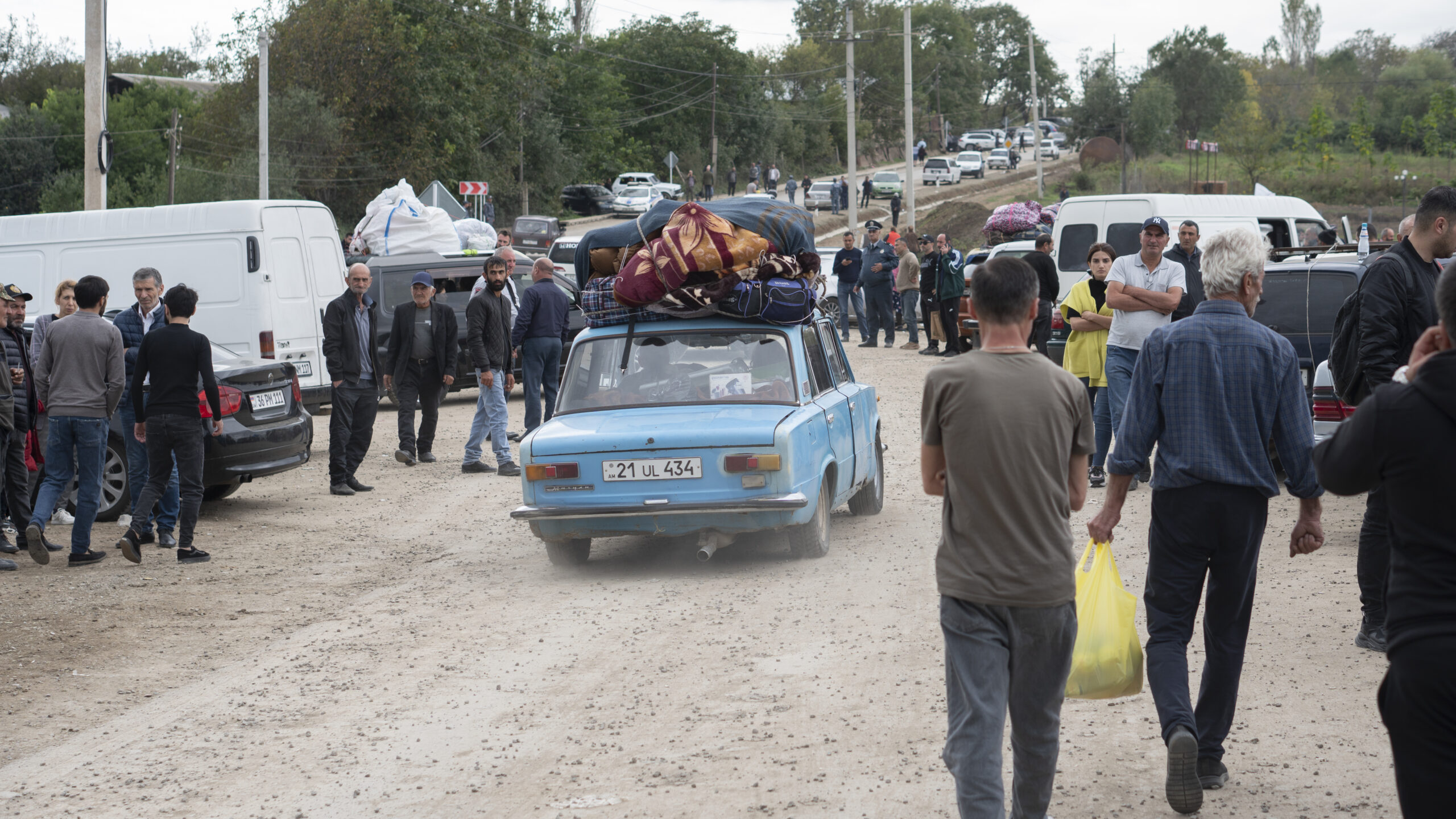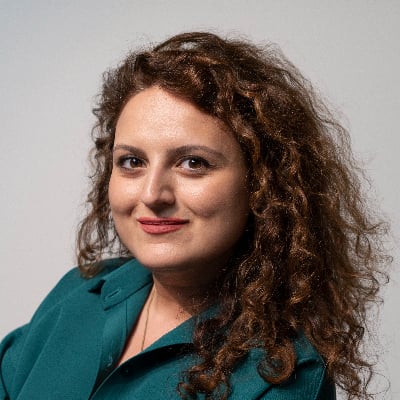
The stories of Artsakh residents who were forcibly displaced, their problems, and their future fate are among the main topics covered by Armenian news websites. Even before the first groups of Artsakh citizens arrived in Armenia, many Armenian media outlets sent their employees to Kornidzor to hear first-hand accounts and to share the experiences of those who had to pack their entire lives in one suitcase, the pain of losing their homeland, and the arduous and lengthy journey they had to take to reach Armenia as displaced persons.
Media editors and program managers in Kornidzor, Goris, and Vaik were interviewed by Media.am.
Anahit Baghdasaryan, head of programs of the Goris Press Club
This time, I didn’t know how to formulate the question so that I wouldn’t suddenly hurt or offend them unnecessarily
The Goris Press Club NGO has been actively working on multiple fronts in recent days. We have been publishing daily photo stories on social media to portray the situation in Goris and Kornidzor accurately. Additionally, we have conducted interviews and filmed our fellow citizens to create a comprehensive multimedia presentation covering the past week’s events.
It was challenging to work technically, psychologically, and emotionally. I strove to capture every important event and episode as the situation changed every hour.
As a journalist, balancing professional duties with emotional turmoil during a situation like this was extremely difficult. Witnessing people pack their entire lives into a single car to be transported to Armenia was heart-wrenching, particularly as an Armenian myself.
After the 2020 war, I felt that the situation was dire. Many people were forced to leave their homes and seek refuge in Goris. However, while working with the people of Artsakh, I realized there was hope for the future. My conversations with them revealed that they remained optimistic and committed to returning to Artsakh and rebuilding their lives. Despite their challenges, they were determined to continue working and creating, which gave me hope for a better future.
I struggled to articulate my question this time; I was afraid to cause emotional distress inadvertently. Even the most straightforward question, such as “What did you leave behind in Artsakh?” had vastly different meanings for different people. For some, it meant leaving behind their homeland, their land, and their homes. For others, it meant leaving behind the bodies of their loved ones. It was a challenging situation when it came to communication.
At that moment, you work mechanically. But when you review your materials and read your transcripts, you can’t help but cry.
As a Goris-based NGO, our entire staff participated in volunteer work. At night, I substituted 14-year-olds at the registration point so they could get some rest.
These days, our organization has collaborated extensively with various international partners. When our media partners required assistance, we coordinated and supported their work to make more information available to the international press.
Heghine Buniatyan, head of the Armenian Service of Azatutyun radio station
Journalism is the draft of history; we are the first documenters of reality
On September 19, following the attack by Azerbaijan, concerns about the safety of Karabakh Armenians escalated. As a precautionary measure, we asked our correspondent working in Goris to relocate to Kornidzor. Two days later, when military operations ceased and Karabakh authorities surrendered their weapons, reports surfaced that people wanted to leave the area as soon as possible.
It had become evident that one journalist could not cover everything, so we sent a team from Yerevan to Kornidzor.
This event was one of the most tragic occurrences in the history of newly independent Armenia. We had no other option but to do our best to document what happened on the scene. They say journalism is the first draft of history, and we are the first to document reality.
We did our best to accurately portray the events in Karabakh leading up to the hardships people faced on their way to Armenia.
Throughout our work, the most challenging aspect was dealing with the situation and the complex psychological state of the people of Artsakh. It was evident that giving interviews and interacting with journalists was challenging and undesirable for them at this stage, where the real difficulties began. Understanding how to communicate effectively with the people, what questions to ask, and how to share children’s stories was necessary, ensuring no ethical oversights or shortcomings.
It was crucial to be meticulous and cautious with every detail and word to avoid further exacerbating the already tense and delicate situation.
Sevak Mamyan, editor of Infocom news site
Emotionally it was extremely challenging
The editorial team had previous experience working in crises, but this was the first time we had encountered a situation of this scale. The first group left for Kornidzor on September 25, and we worked from both the reception points in Goris and Kornidzor. When the Vaik reception point was opened, we dispatched a team to Vaik as well.
When we sent the first group of journalists, we were unsure if they were emotionally prepared to cover such a situation. However, we ultimately decided they needed to go, as being on the ground and receiving first-hand information would help them better understand the situation.
The first day was particularly challenging, and at one point, we realized that one of our journalists was emotionally drained. However, they found an optimal way to work through it and continue their reporting.
There were emotional difficulties, and people were hesitant to work with journalists. Preliminary conversations and permissions were necessary for people to agree to interviews, share their stories, and take photos.
There have been instances where individuals declined to speak or have their pictures taken before the camera but still shared their stories.
In some cases, they requested that their name not be disclosed. We have altered the protagonists’ names and only then published their stories in such situations.
Our expectations that those forcibly displaced from Artsakh would not speak were initially pessimistic.
However, some individuals seemed to need communication, they wanted to talk and share their stories.
Arevik Sahakyan, Executive Director of Factor TV
There were cases when our teammates helped reunite compatriots who had lost contact.
Following the meeting in Evlakh on September 20, where it was determined that our fellow citizens would be displaced, we immediately held discussions. We decided to send some of our team members to Goris. From September 21, our correspondent worked on-site, sending us quick updates. Later, we dispatched two film crews to Kornidzor and Goris. Our team of journalists worked tirelessly on the ground until the very end.
Our top priority is to get first-hand information on-site. We prefer to cover significant events through live broadcasts whenever possible, reducing the need for buffer or analytical formats.
There were cases when our teammates helped reunite compatriots who had lost contact.
Some of our videos have been requested by the Ministry of Foreign Affairs and the HRD Office for use as evidence in legal proceedings. One such example is our video about a 60-year-old woman from Artsakh. The Azerbaijanis tortured her for several days.
Lately, the work has been extremely tense and emotionally harsh. We are always cautious with our publications, reported information, and word choices to ensure we don’t harm our compatriots who are still in Artsakh or on the road; this makes our work more challenging and responsible.
Unfortunately, we had experience working in crises. We have developed guidelines for conduct in such situations, but each crisis presents unique challenges.
For example, choosing the right words and using terms and concepts was problematic. What term should have been used from the beginning: ethnic cleansing, forced displacement, refuge? This should not have been left to the discretion of the media.
Our state agencies have not developed institutional regulatory behavior of strategic communication.
However, our mass media quickly organized themselves and showed the right approach.


Add new comment
Comments by Media.am readers become public after moderation. We urge our readers not to leave anonymous comments. It’s always nice to know with whom one is speaking.
We do not publish comments that contain profanities, non-normative lexicon, personal attacks or threats. We do not publish comments that spread hate.